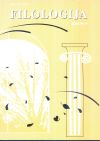Garsų pasaulis ir jo raiška Juozo Baltušio ,,Sakmėje apie Juzą”
The World of Sounds and its Expression in Juozas Baltušis’ Novel “The Story of Juza”
Author(s): Jūratė LubienėSubject(s): Language and Literature Studies
Published by: VšĮ Šiaulių universiteto leidykla
Keywords: the semantic field of sounds; the verb; a lexeme; lexical valency; statistical analysis; frequency of use
Summary/Abstract: The article analyses the vocabulary of the semantic field of sounds in the novel “The Story of Juza” by J. Baltušis. It has been established that the major part of sound-denoting words belongs to the verb, and other parts of speech are few: several nouns, adjectives, and interjections. Among the verbs, the most frequently used lexemes are: 'juoktis' ’to laugh’, 'rėkti' ‘to scream, to shriek’, 'raudoti' ‘to wail’, 'ūžti' ‘to murmur’, and 'šaukti' ‘to shout’. The text contains plentiful dialectal rarely used sound-denoting words. The major part of the verbs have been discovered to denote sounds produced by inanimate objects or natural phenomena. The inanimate objects mainly produce sounds resulting from a blow, blows or explosion. Among the lexemes that denote sounds made by living creatures, about a half refer to the sounds made by birds, mainly sparrows, crows and geese. Among the animals, the most frequently used verbs denote the sounds made by horses and dogs, and among the insects, those made by bees. There are only few lexemes to denote the sounds made by man, however, the frequency of their use in the text is the greatest. On the basis of the analysis of the semantic structure and the lexical valency of the verbs, it has been established that among all the acoustic features it is the loudness that has been most frequently and distinctly characterized in the text.
Journal: Filologija
- Issue Year: 2004
- Issue No: 09
- Page Range: 24-30
- Page Count: 7
- Language: Lithuanian

